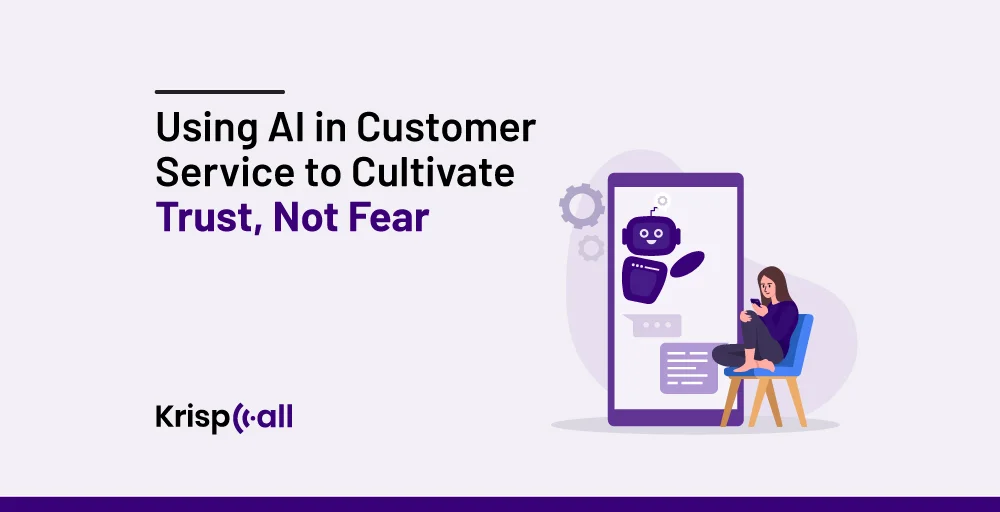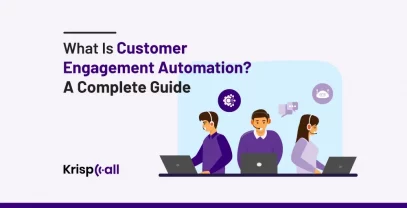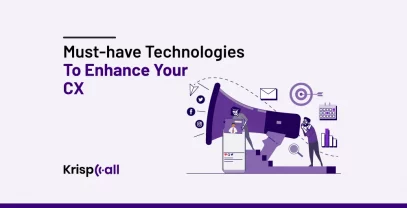As Artificial Intelligence (AI) continues to transform various industries and everyday life, its effect on customer experience (CX) brings both enthusiasm and worry. A recent survey by Genesys of 1,000 U.S. consumers in late 2023 found that 72% are concerned AI automation might make it harder to reach a human representative.
Businesses looking for efficiency through automation may benefit from AI in customer service, but customers seeking the personal touch might be wary of using AI.
However, will this ongoing challenge remain as AI progresses and becomes more human-like with generative technology? Can businesses leverage AI to show that humans and AI can work together to improve customer experiences?
This blog will explore how businesses can use AI to create customer service experiences that build trust. We’ll also cover the benefits that AI provides and its evolution.
🔑 KEY HIGHLIGHTS
- Artificial intelligence (AI) is a technology that enables computers and machines to simulate human intelligence and problem-solving capabilities.
- Almost 56% of businesses have started using AI for customer service.
- From the first chatbot (ELIZA) to Open AI, chatbots have come a long way in the digital world.
- AI can be used to provide 24/7 customer service and quick support, increase efficiency, enhance customer satisfaction, and build trustworthy relationships.
- Popular businesses and technology companies like Alibaba, Apple, Meta, and Microsoft use AI to improve customer service.
The Benefits of AI in Customer Service
AI is a technology that simulates human intelligence into machines, especially computer systems. It provides a computer program with the ability to think and learn independently and learn from the information and experience to help solve problems or complete tasks.
Many businesses have already started using AI, and almost 56% of them use AI for customer service and customer relationship management. Generative AI in customer service plays plays a significant role in enhancing customer experiences and customer service across various touchpoints. It also offers various benefits that help businesses become more productive and active.
Here are some top advantages of incorporating artificial intelligence into customer service.
- Low-cost: As AI automates all routine tasks and inquiries, the company does not have to spend money on things that AI can do. Also, a single AI can do the tasks of many employees without the need for human touch. This reduces the cost of hiring more employees and other operational costs.
- Personalize the client experience: AI can analyze reviews, feedback, and media interactions to gain a deeper understanding of customers’ feelings and attitudes. Businesses can use this information to provide better customer experiences, taking into account customers’ concerns and preferences.
- Improve customer satisfaction: AI can help businesses provide fast and convenient service. A chatbot can deliver 24/7 support, increasing customer satisfaction.
- Increase productivity: When AI automates all the routine tasks, it eliminates agents’ repetitive tasks. This automation reduces agents’ workload, and they can focus on more important things.
- Handle high support demand: AI agents can handle all customer requests over any channel, helping teams effectively manage high support volumes.
These benefits highlight why many businesses use AI, enhancing customer service and overall sales.
Evolution from Basic Bots to Advanced AI: How Has AI Changed Customer Service?
Joseph Weizenbaum established chatbots in 1966. The first-generation chatbot was named ELIZA. It recognized simple keywords and had limited basic bot features. However, these chatbots failed to handle and understand more complex or exact customer needs. They didn’t have natural language processing, which resulted in repetitive interactions. Later, customers became more dissatisfied and impatient with these chatbots.
Later, in the early 2010s, chatbots became more convenient and were capable of Natural Language Processing (NLP) and Machine Learning(ML). These chatbots were way more advanced than the first-generation ones. They could understand natural language more accurately, learn from past interactions, and even understand voice commands. Many businesses, such as contact centers, use Conversational Agents to work on repetitive tasks and solve problems. Moreover, these systems could also detect more customer sentiments and offer different call center real-time suggestions.
In the late 2010s, Generative AI was introduced, which completely revolutionalized the history of chatbots. Transformer neural networks and large language models (LLMs) such as Jasper AI, Chatgpt, and Bard paved the way for generative AI chatbots. These chatbots had amazing machine learning features that helped them understand natural language (NPL) faster and much better than the previous chatbots.
Today, AI has advanced significantly, leading to OpenAI, which introduced ChatGPT for business. ChatGPT is a generative AI that combines a large language model with a large variation of artificial intelligence. These “smarter chatbots” have good writing ability, can perform research, and generate images and audio.
The journey from basic bots to advanced AI in customer service has transformed how businesses interact with their customers. The advancements in generative AI, machine learning, and NLP have addressed the limitations of early AI systems, providing a more efficient and satisfying customer service experience.
The Fear of AI in Customer Service
While AI offers significant advantages in customer service, several fears and concerns accompany its adoption. Here are key fears:
1. Job Displacement
One of the most prominent fears is that AI will replace human jobs in customer service. Many roles traditionally performed by human agents, such as handling routine inquiries and support tasks, are at risk of being automated. This potential for job loss can lead to economic insecurity for employees in the customer service industry.
Additionally, the transition to AI-driven systems may require workers to acquire new skills, which can be difficult and impossible for everyone.
2. Impersonal Interactions
Customers often value the empathy, understanding, and personal touch that human agents provide. AI-driven customer service interactions can sometimes feel impersonal and robotic 🤖, lacking the emotional intelligence that human agents bring.
This can decrease customer satisfaction, especially when customers need an empathetic response. The fear is that customers might feel disconnected or undervalued when interacting with an AI system.
3. Data Privacy and Security
AI systems require vast amounts of data to function effectively, raising significant concerns about data privacy and security. Customers fear that their personal information could be mishandled, exposed to cyber threats, or used without consent.
High-profile data breaches and data misuse have increased these concerns. Customers are worrying about their collected data and personal information.
4. Technical Dependence and Failures
Over-reliance on AI can make businesses vulnerable to technical failures, system malfunctions, or cyber-attacks. If AI systems go down or malfunction, it can severely disrupt customer service operations. This malfunction can lead to frustration and dissatisfaction among customers.
Moreover, the complexity of AI technology can make it challenging for customers and employees to understand and troubleshoot issues.
How Can AI Be Used in Customer Service to Grow Trust?

AI in customer service helps to improve customer satisfaction, boost agent efficiency, automate repetitive work, and handle a lot of work in a single time. Here’s how you can use AI to grow trust in customer service:
1. 24/7 Availability
Unlike human agents, who can only work 8 hours a day, AI doesn’t need rest or sleep. It can work up to 24 hours a day. It can be used to offer 24/7 customer support.
Different types of AI-powered chatbots and virtual assistants provide 24/7 support, ensuring customers receive assistance anytime. This continuous availability builds trust, as customers know they can always get help when needed.
2. Quick and Efficient Responses
Customers always expect a quick, effective, and accurate response from any business. If their problem is not fixed on time, the chances of them switching businesses are much higher.
So, many businesses have harnessed AI to enhance customer relationships by analyzing and responding to customer queries and offering real-time assistance. This efficiency in handling requests and solving problems reduces wait times and increases customer satisfaction, building trust.
3. Personalized Customer Experiences
Many businesses use AI to analyze customer data and offer personalized recommendations and solutions. AI uses algorithms to evaluate the customer’s overall journey, from purchasing history to transaction.
With the data, AI offers personalized recommendations and helps businesses tailor the customer experience. This personalization makes customers feel valued and understood, strengthening their trust in the company.
4. Proactive Customer Support
AI can analyze data and predict potential customer issues. Its algorithms proactively identify and resolve possible problems in real-time, enhancing interactions before there’s a real problem.
Moreover, AI can proactively address problems before they impact the customer. This proactive approach shows customers that the company is committed to their satisfaction and well-being.
5. Data Security and Privacy
Data security and privacy are major concerns for customers and businesses alike. Since AI can access a vast amount of personal customer data, many people view AI as a potential threat to their privacy.
However, businesses that use advanced AI technology can protect their customers’ personal information more effectively as this advanced AI technology has advanced security measures like end-to-end encryption, two-factor authentication, etc. Additionally, advanced AI can enhance data security by identifying and mitigating potential threats, ensuring a safer environment for sensitive data.
Examples of Successful AI Implementation in Customer Service
1. Alibaba
Chinese company Alibaba is the world’s largest e-commerce platform, surpassing the combined sales of Amazon and eBay. AI plays a vital role in Alibaba’s daily operations, helping to predict customer preferences.
Moreover, it also helps businesses generate product descriptions using natural language processing. Companies can attract customers with their attractive service descriptions. Through Alibaba Cloud, the company can monitor its sales and cut costs using AI technology.
2. Apple
Apple, one of the world’s largest technology companies, is renowned for its consumer electronics, such as iPhones and Apple Watches, as well as various software and online services.
Apple integrates AI and machine learning in many products. For instance, AI enables FaceID on iPhones and powers the smart assistant Siri on devices like AirPods, Apple Watch, and HomePod.
3. Facebook
Facebook uses AI to deeply learn more about customers and bring structure to massive amounts of unstructured data. Using an AI algorithm, Facebook suggests and recommends the product or service they are searching for to users. It calculates which content most likely appeals to each user and then delivers a personalized feed.
Facebook’s AI also detects and removes content that goes against our Community Standards before anyone reports it.
4. Microsoft
Microsoft prominently features AI in its vision statement, showcasing its commitment to integrating intelligent machines into all aspects of its operations. Microsoft incorporates AI capabilities into products and services such as Cortana, Skype, Bing, and Office 365.
Additionally, Microsoft is a leading provider of AI as a Service (AIaaS), offering intelligent solutions to various industries. This software helps businesses connect more with customers using a Microsoft product.
Conclusion
Using AI in customer service offers businesses a significant opportunity to build trust and enhance customer satisfaction. By efficiently managing routine tasks, AI allows human agents to focus on more complex issues and create a more personal connection with customers.
However, the key to success is using AI thoughtfully to create efficient and personal interactions. Businesses that leverage AI to provide quick responses, personalized experiences, and 24/7 support will improve customer satisfaction and build a foundation of trust.
By addressing common fears associated with AI, such as job displacement and impersonal interactions, companies can ensure that their AI implementations are seen as trustworthy and reliable.
As AI technology continues to evolve, businesses must keep up with this technology. They should continuously improve and adapt AI strategies to meet customer needs. This approach will help them maintain a business and build long-lasting customer relationships.





